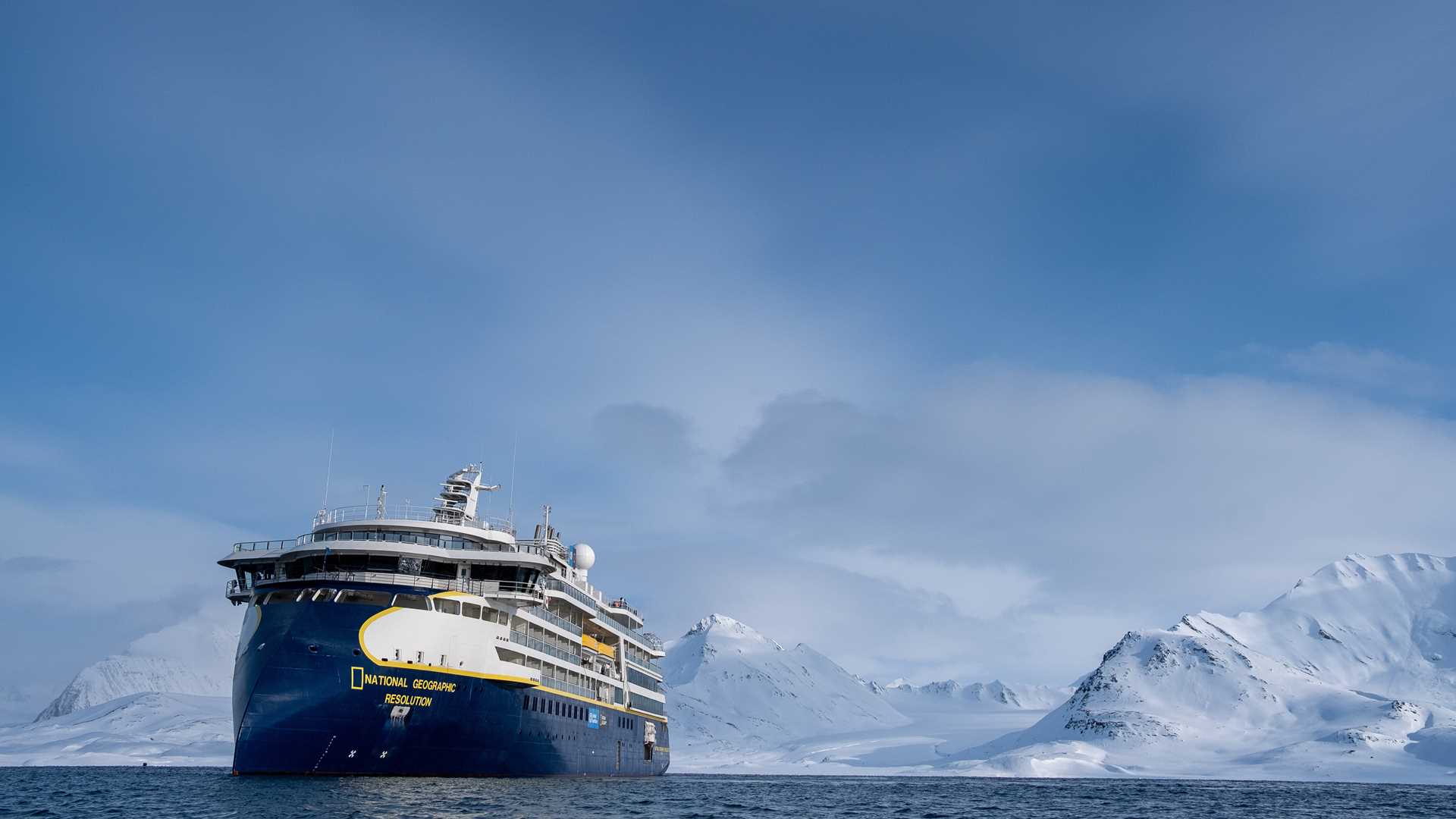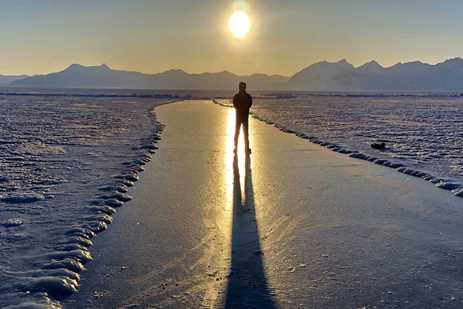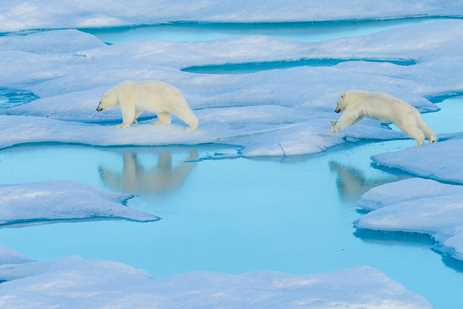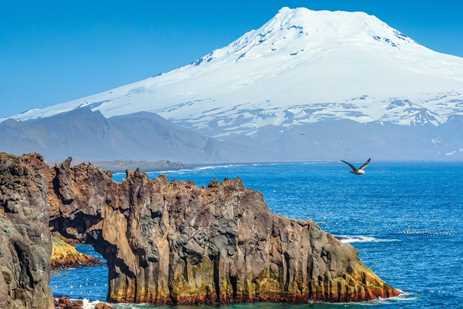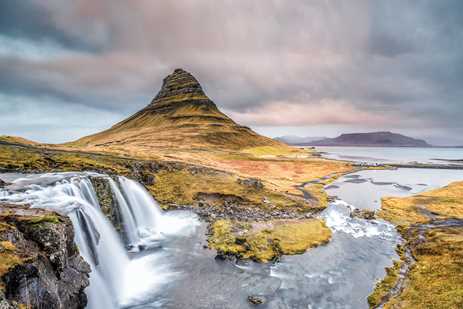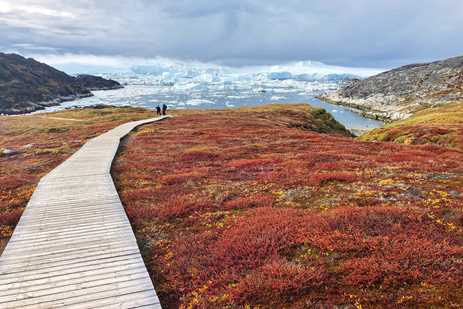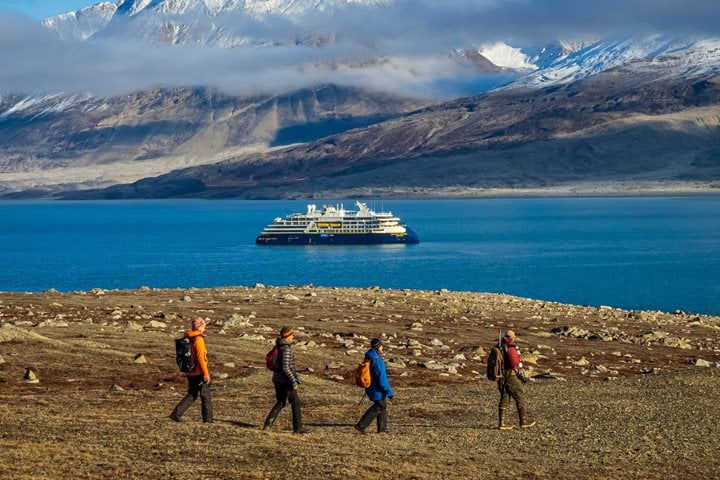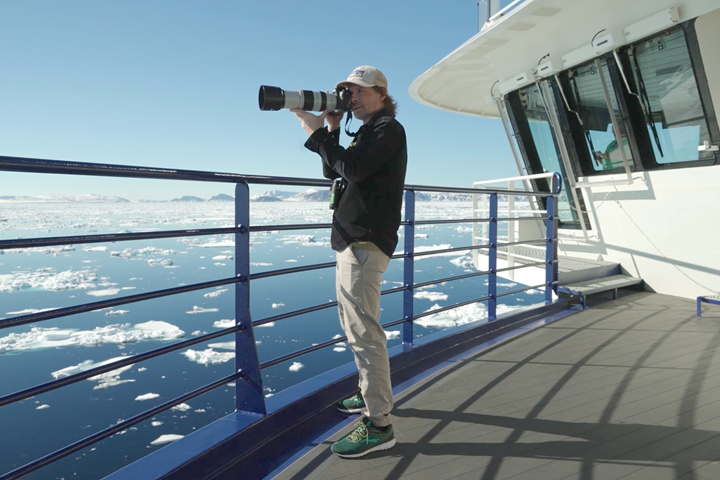Call +1.800.397.3348 or contact your travel advisor
The Arctic is a realm of dazzling icescapes and incredible creatures—and a true bucket-list destination for travelers. If you are considering making the trip, you might be wondering about the expense of exploring this remote wilderness.
Your destination is a key factor in Arctic cruise prices—particularly if your itinerary includes a visit to the North Pole. A North Pole cruise price can include additional costs due to the challenges of sailing to the planet's most northerly point. But the fare is influenced by far more than location. Here, we consider the variables that can impact the cost of voyaging to the Arctic Circle.
How Much Does It Cost to Go to the Arctic?
Depending on the company you choose, expect to pay between USD $7,000 and $49,500 for an Arctic cruise, with an average cost of $15,000 per person with double occupancy. If you book an Arctic expedition with Lindblad Expeditions-National Geographic, shorter trips to the region can range from $7,000 to $17,000 while more epic voyages that span up to 24 days will range from $18,000 to $45,000.
There is wide variation in the types and sizes of ships that sail the Arctic, the onboard experience they offer, the extent of activities travelers can participate in off the ship, and the level of regional expertise provided by accompanying guides and experts.
Quoted prices for our expedition cruises are inclusive of the full expedition experience; however, other company prices might only cover a cabin and meals, and additional expenses—such as flights, shore excursions, and gratuities—may not be included in your Arctic expedition cost.
See what’s included on a Lindblad Expeditions-National Geographic voyage
How Much is a Cruise to the North Pole?
Expect to pay at least USD $28,000 for a cruise to the North Pole, with prices going up from there. This range of North Pole expedition costs takes into account the travel company, the category of cabin, the itinerary, and extras that are included in addition to room and board.
It is an expensive logistical challenge for most travel companies to reach the North Pole, which is often blanketed by impenetrable ice. The exact coordinates are not fixed, and vessels need special capabilities to venture safely through these conditions. Moreover, many North Pole access points involve Russian territories, which are affected by the ongoing conflict in Ukraine. Only a handful of cruise operators attempt to reach the geographic North Pole, which is essentially barren.
Although we do not offer itineraries that include the North Pole, we do sail above 80 degrees north on true voyages of exploration. For instance, ice conditions and wildlife activity determine the path we take through one of the Arctic's most legendary sea routes on our Northwest Passage: Greenland to Alaska expedition, where the rhythms of nature lead us to thrilling discoveries.
How Your Ship Will Impact Arctic Cruise Prices
You’ll find several different types of ships that venture to the Arctic, including research vessels, cruise ships of varying sizes, private yacht charters, and expedition ships like those in the Lindblad Expeditions-National Geographic fleet. The size and style of your vessel, the level of onboard service, and the array of amenities and activities included will all define your Arctic adventure and impact the price of the cruise.
The experience of a guest on an agile ship that carries no more than 150 guests and offers instant access to the outdoors compared with a guest on a huge cruise ship will be markedly different. Before booking, investigate how immersive the activities are and how often you will be able to disembark for more in-depth discovery of your surroundings.
Exploring alongside a veteran expedition staff is also key to the experience. Expert naturalists and certified photo instructors join each of our voyages to help travelers interpret and document the wild wonders of the Arctic. They give lectures on board and join guests for onshore excursions. The low guest-to-staff ratio ensures guests can hear different perspectives and gain new insights every day.
A company’s commitment to conservation is also a good gauge to use when selecting your Arctic travel operator. When organizations invest back in the places they explore, they often have closer ties to local cultures and a better understanding of the region’s wildlife and habitats — all of which means a more in-depth experience for the traveler.
For maximum safety, consider a polar-class vessel like the icebreakers in the Lindblad Expeditions-National Geographic fleet. It should have robust life-saving protocols, be equipped with the latest in navigational and safety technology, and be staffed by a veteran ice crew.
A small ship size, the expertise of the crew and onboard expedition team, and the presence of robust conservation initiatives are often associated with a premium experience. Conversely, the larger the ship is and the less experienced the staff and crew are, the less expensive an Arctic cruise will be.
Arctic Research Vessels
Arctic research vessels were originally built for scientific research but are now used as passenger ships. Their rugged environs channel the spirit of a genuine expedition, while their relatively compact size allows them to make more landings and navigate small harbors. Arctic cruise prices for these types of vessels reflect their basic interiors.
Learn about the National Geographic Explorer
Arctic Expeditions Ships
An expedition ship — small and comfortable, yet sturdy and ice-strengthened — is a popular option for an Arctic expedition cruise. Most are specially designed for adventure in the geographies they sail so that guests can maximize their travel experience both on board and on shore. These ships offer intimate and in-depth voyages; they usually carry fewer than 150 guests, have low guest-to-staff ratios, feature onboard experts from a variety of fields, and offer a wide variety of immersive excursions.
Learn about the National Geographic Resolution
Luxury cruise ships increase the Arctic trip cost, but they often include activities and amenities you won’t find on other cruises. For example, all shore excursions are included on our voyages. You won’t be charged extra for a guided hike to a waterfall, a cultural performance, or a museum visit.
Luxury ships like the vessels in our fleet also offer elevated culinary programs that incorporate fresh ingredients and feature meals inspired by the culinary traditions of the regions you visit. Amenities such as hot tubs, saunas, yoga studios, and spas invite travelers to relax and rejuvenate during down time at sea or following active days exploring the Arctic’s icy wonders.
Learn more about the National Geographic Endurance
A luxury cruise ship’s low guest-to-staff ratio ensures high-touch service throughout the journey. Lindblad Expeditions has an outstanding ratio of no more than 16 guests for every expedition team member, and our exclusive alliance with National Geographic provides guests access to leading naturalists, noted historians, and certified photo instructors who know the Arctic well. A full suite of expedition tools like Zodiacs and kayaks allow up-close exploration in remote and icy landscapes.
Other cruise lines might seem less expensive at first glance, but on further examination you’ll find they charge fee after fee for extras like shore excursions. Lindblad’s expedition fees include shore excursions and onboard activities, gratuities, alcoholic beverages, and much more. Many travelers find that our all-inclusive pricing makes budgeting for their travel expenses easier.
Learn more about luxury Arctic cruises
How to Find an Affordable Arctic Cruise to the Arctic Circle
Trips to the Arctic cost more than the average expedition due to the remoteness of the destinations and challenging weather conditions in the region.
A lack of tourism infrastructure such as rental cars and roads means traveling by ship is often the most efficient way to explore. However, reaching the Arctic Circle can be a challenging and expensive proposition for travel companies, requiring special ships and equipment, permits, and captains, crew, and staff with specific knowledge.
There are many factors to consider when searching for an affordable Arctic cruise, and while it is possible to save on certain aspects of the voyage, there are also opportunities to splurge and make the experience all the more exceptional.
Ways to Save Money Going to the Arctic Circle or the North Pole
Although an Arctic adventure might feel out of reach, there are ways to cut costs and make your dream trip a reality.
You might consider a shorter itinerary in a closer destination such as Iceland, or spend time searching for deals to find more cost-effective options. Shorter itineraries and off-peak travel are often less expensive, and the tradeoffs might be worth it depending on your interests.
It's a great idea to follow some of your favorite cruise lines on social media and sign up for their newsletters and emails so you can be the first to know about special savings.
Most cruise companies offer promotions throughout the year, and you may be able to take advantage of time-sensitive promotions, such as early bird discounts or last-minute deals. Other common offers include special deals for past guests, families with children, groups, and single travelers, as well as value-added specials like free airfare.
Remember that ships always have a range of cabin options, and choosing one that’s smaller, on a less-coveted deck, or with a less desirable view will be more affordable.
When to Splurge on an Arctic Expedition
Safety is one factor you don’t want to skimp on when booking an Arctic cruise. Lindblad Expeditions-National Geographic has over 50 years of experience in every region of the Arctic and an outstanding safety record navigating small yet powerful ships with ice breaker hulls.
A longer voyage or an itinerary that features rarely visited destinations is splurge-worthy for access to truly off-the-beaten-path wilderness and more opportunities to experience highlights like wildlife sightings or the aurora borealis.
Traveling at peak times sometimes comes at a premium, but it can be worth it to explore a region under the best weather conditions and during prime wildlife-viewing seasons.
Spending extra for a particularly elegant cabin that includes a balcony or a sitting area and choosing a ship with infinity hot tubs, a spectacular yoga studio, or an onboard igloo where you can spend the night under the stars will make a once-in-a-lifetime Arctic adventure even more special.
Other Costs to Consider
In addition to the cost of the cruise, there are other fees associated with an expedition to the Arctic, including flights, excursions, gear and clothing, and trip insurance. Some travel companies may include some of these extras, so it is important to compare total costs.
Cost of Flights for an Arctic Cruise
Flight costs depend on a number of factors, including home and destination airports, date of travel, airline, number of stops, time of booking, and class of service.
Oslo, Norway is an easy-to-reach airport that has connections to Longyearbyen, Svalbard, a popular Arctic cruise embarkation port. A round-trip flight in economy class from New York City to Oslo can often be less than $800. Traveling all the way to Longyearbyen can increase that cost to between $800 and $1,000. We charter flights to and from Oslo and Svalbard, ensuring that guest tickets are secured as part of the expedition booking.
A round-trip economy class flight from New York to Kangerlussuaq, Greenland is often upwards of $1,000, while flights to the Icelandic capital of Reykjavik can run as low as $500 during the peak Arctic travel season.
Read more about How to Get to the Arctic
Arctic Cruise Excursions Costs
If the company you’re sailing with does not include the cost of all shore excursions — which Lindblad Expeditions-National Geographic does — the prices will vary depending on the type and length of activity. A museum visit, for example, will cost significantly less than say, a helicopter tour.
The cost of shore excursions offered by other Arctic cruise companies can add up quickly.
For example, one operator charges $149 per person for a 2.5-hour boat trip into Greenland’s Ilulissat Icefjord, while a 7-hour tour of Iceland’s Snæfellsnes Peninsula is generally around $130 and kayaking in Svalbard for 3 hours costs around $700. A party of two on a 10-day Arctic cruise could expect to pay upwards of $2,500 for off-ship activities.
Gear and Clothing
To prepare for your Arctic adventures you'll want the right gear to keep you warm, safe, and dry. From insulated clothing to help withstand chilly temperatures, to comfortable boots needed for walking on icy terrain, each piece of gear is a vital component of your expedition.
You may also wish to purchase specialized exploration tools, such as binoculars or a waterproof rucksack. Taken together, the cost of the gear can add up, with price variations reflected in the quality and brand of the items.
Some examples of appropriate Arctic-weather items and their approximate costs include merino wool long johns ($125); thermal socks ($25); wool turtleneck ($150) and trousers ($220); waterproof outer pants ($575); parka ($1,000); Nordic hat ($80), gloves ($130), and boots ($400).
We provide a parka or jacket for each guest voyaging to polar regions that they can take home with them. Once on board, guests may also rent gear like boots and hiking poles, which can help save on items that won’t be useful after the expedition.
Here’s a detailed outline of how to dress for the Arctic
Arctic Cruise Travel Insurance Cost
Some travel companies require travel insurance to protect your Arctic expedition, but it's a good idea to consider purchasing a plan even if they don't.
Costs for a policy depend on the destination and duration of your trip as well as other factors such as the type of coverage you are buying, which can range from trip cancellations and interruptions, to medical treatment and evacuation, and baggage damage or loss. Generally, a basic Arctic cruise travel insurance policy is about $250 per person.
Other Costs to Consider While Traveling to the North Pole
Travel to the Arctic and the North Pole comes with all the costs outlined here that you might have thought about as well as some that maybe aren’t as apparent.
Some hidden costs in your Arctic travels are small, but others are sizable and can increase your final price by a considerable amount.
On an Arctic expedition, you will encounter dining room staff, cabin stewards, guides, and others who often rely on tips as a part of their compensation. Some expedition cruise lines like Lindblad Expeditions-National Geographic include gratuities in the flat expedition fee, but others add an average of $15 per day per guest. Gratuities can add up to several hundred dollars per guest.
Ships are charged port fees, and some cruise lines pass on these charges to guests; Lindblad Expeditions-National Geographic does not. These fees can result in hundreds of extra dollars in charges on a final bill and are often not disclosed ahead of time.
Many cruise lines charge for every drink — alcoholic or nonalcoholic — and also attach a service fee of approximately 20 percent to shipboard purchases like drinks and spa treatments; Lindblad Expeditions-National Geographic does not.
Airport transfers, passports and visas, souvenirs, and Wi-Fi are other fees to consider.
North Pole and Arctic travel are utterly unique endeavors. The planning, costs, and time away result in a truly rewarding and memorable experience that is unparalleled in adventure travel.
Find out the differences in travel to the Arctic and Antarctica

